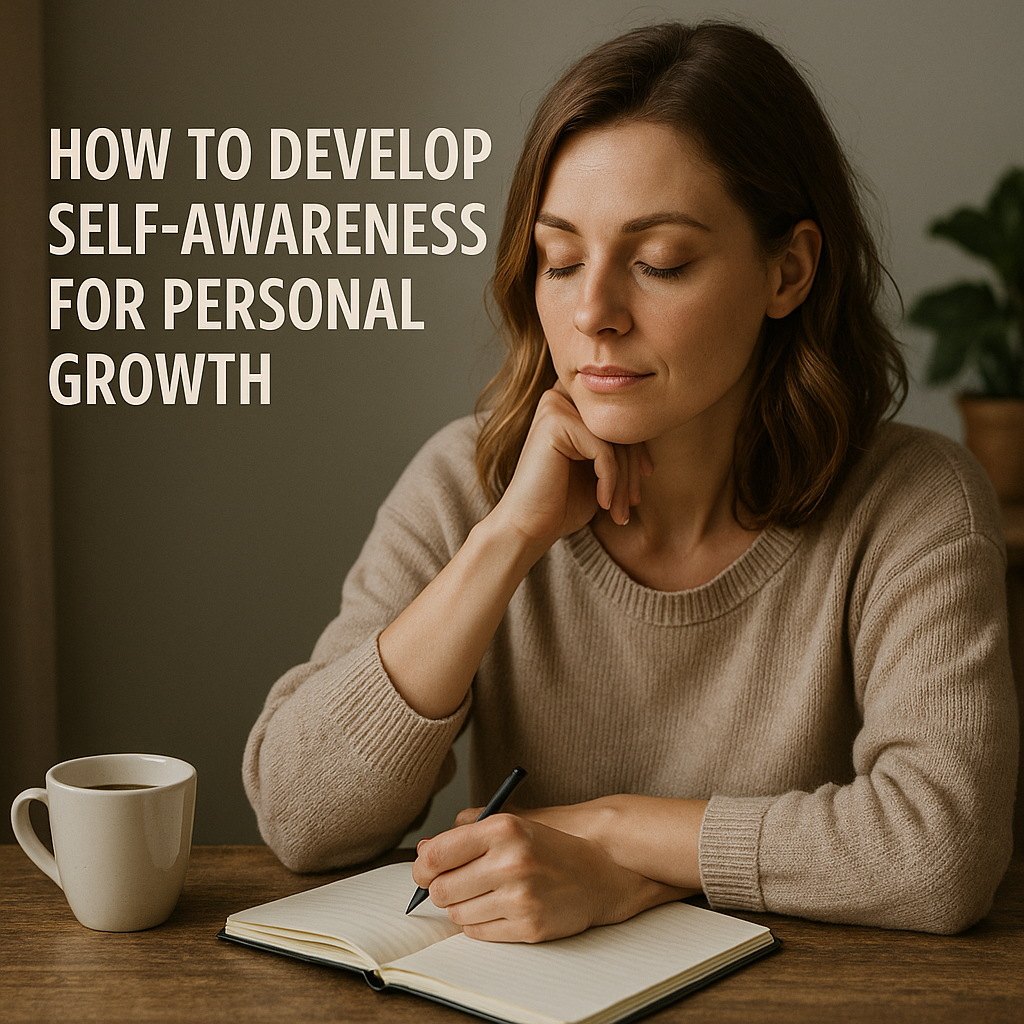Self-awareness is one of the most powerful tools you can develop on your journey to personal growth. It’s the foundation for emotional intelligence, better decision-making, stronger relationships, and a deeper understanding of who you are — and who you want to become.
Yet, many people go through life without pausing to reflect on their thoughts, emotions, and behaviors. In this article, we’ll explore what self-awareness really is, why it matters, and how you can start cultivating it in your everyday life.
What Is Self-Awareness?
Self-awareness is the ability to observe your thoughts, emotions, and actions objectively. It’s the practice of stepping outside yourself to better understand your motivations, triggers, and patterns.
There are two main types of self-awareness:
- Internal self-awareness: How well you know your values, passions, goals, and reactions
- External self-awareness: How well you understand the way others perceive you
The more self-aware you become, the more intentional your actions and decisions can be.
Why Self-Awareness Matters
Without self-awareness, it’s easy to:
- React impulsively instead of responding thoughtfully
- Stay stuck in unhelpful patterns
- Blame others for your discomfort
- Struggle with confidence and self-worth
- Miss out on personal growth opportunities
With self-awareness, you’re able to:
- Set aligned goals
- Improve emotional regulation
- Strengthen communication skills
- Identify what’s truly important
- Build a more meaningful life
Self-awareness helps you lead your life — instead of being led by it.
1. Practice Daily Reflection
Reflection is the cornerstone of self-awareness. By taking time to review your thoughts and actions, you gain clarity on what’s working and what’s not.
Daily reflection prompts:
- What did I feel most strongly today?
- What triggered stress or joy in me?
- How did I respond — and why?
- What would I do differently next time?
Use a journal, a voice note, or quiet time before bed to build this habit.
2. Ask for Honest Feedback
We all have blind spots. Feedback from others helps you see what you might be missing — especially in how you’re perceived.
How to ask for meaningful feedback:
- Choose people you trust and respect
- Ask open-ended questions: “What’s something I could improve on?”
- Receive feedback with curiosity, not defensiveness
This can be challenging, but it’s a powerful shortcut to growth.
3. Observe Your Emotional Triggers
Pay attention to moments when your emotions spike — anger, jealousy, fear, shame. These intense feelings often point to deeper wounds or unmet needs.
Ask yourself:
- What exactly triggered this emotion?
- What belief or fear is underneath it?
- Is this response helpful or automatic?
The more aware you are of your triggers, the more control you have over your responses.
4. Know Your Core Values
Your values act as your internal compass. When your actions align with your values, you feel fulfilled. When they don’t, you feel conflicted or lost.
To identify your core values:
- Reflect on moments of deep pride or anger — what values were at play?
- Choose your top 5 from a list (e.g., honesty, freedom, growth, compassion)
- Ask: Am I living in alignment with these values?
This clarity guides your decisions and strengthens your identity.
5. Monitor Your Self-Talk
The way you speak to yourself influences your self-image and behaviors. Is your inner voice encouraging or critical?
Try this exercise:
- Catch a negative thought
- Reframe it as if you were speaking to a friend
- Practice replacing harshness with kindness
Over time, self-awareness improves your relationship with yourself.
6. Meditate to Create Space Between Thought and Reaction
Meditation isn’t about clearing your mind — it’s about observing it. Even 5 minutes a day can help you become more aware of your thoughts, patterns, and tendencies.
Beginner-friendly techniques:
- Focus on your breath
- Use guided meditations
- Label your thoughts: “That’s a worry,” “That’s a memory”
This quiet observation builds your emotional intelligence.
7. Track Your Habits and Patterns
Look at your routines and choices — they reveal your priorities and beliefs. By tracking habits, you can uncover unconscious patterns that are either helping or hindering your growth.
Track:
- How you spend your time
- What activities drain or energize you
- Where your attention goes during the day
Awareness turns autopilot into intentional living.
Self-Awareness is the First Step to a Better You
The more you understand yourself, the more power you have to change, grow, and live with purpose. Self-awareness is not a destination — it’s a lifelong practice. Some days will be easier than others. What matters is that you keep showing up.
Start small. Ask one reflective question. Notice one emotional reaction. Choose one action that’s more aligned with who you want to be.
The journey inward is the path forward.
